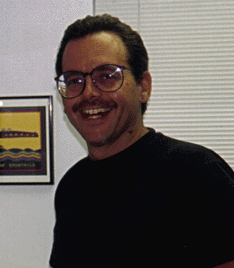![[Currents header]](/homeart/currents_header.gif)
![[Currents header]](/homeart/currents_header.gif)
September 29, 1997

|
|
Manuel Pastor
|
In his first year as chair of Latin American and Latino studies, Manuel Pastor and his colleagues in both his program and the Chicano-Latino Research Center brought in more major grant support than they had hoped to generate in three years. But getting the money only ensures that the real work is yet to come, Pastor said during a recent interview.
The program has attracted $135,000 from the Rockefeller Foundation, $50,000 from the Ford Foundation, and $40,000 from the UC Regents diversity initiative, and plans for the future of Latin American and Latino studies (LALS) are taking shape.
"Fund-raising isn't the end," warned Pastor, who came to UCSC last fall. "It's really just the beginning. We're going to have to work hard over the next couple of years to demonstrate to the foundations, the university, and the community that those investments are worthwhile."
Pastor envisions enhancing the undergraduate LALS program with an annual four-week summer retreat dubbed "Social Change Across Borders" that would bring together community-based organizers and intellectuals from California, Mexico, and Latin America. The idea is to have participants share ideas and collaborate in such a way that individuals from both realms would feel "recharged" and instilled with a renewed commitment to social change.
The hope is that the institute would eventually grow into a master's program with a concentration on community organizing and leadership development in Latino and Latin American communities. In the meantime, organizers of the institute are reaching out to statewide leaders of Latino-focused community-based organizations (CBOs) for input as they design the first session, which is tentatively planned for next summer. The idea is to "test market" plans for the institute among the very people who might like to attend such a gathering--or graduate program--in the future.
"Just as a business school would talk with businesses to learn what is needed from an M.B.A. graduate, we want community leaders to have input regarding what should be included in our program," said Pastor.
CBOs provide support services around issues such as housing, job development, educational access, violence against women, and services for elders. In recent years, such organizations have come to play a key role in Latino communities on both sides of the border, said Pastor.
"One of the things that Latino populations in the United States have in common with Latinos in Mexico and Latin America is that political representation is very low and problematic," said Pastor. "As a result, community organizations are increasingly being called on to mediate between the state and the community. We need to respond to the needs of those organizations, which are stretched very thin and rarely have time for reflection, and we need scholars to get involved."
The institute, and ultimately the master's program, would provide training and educational opportunities for those on the "front line" of community organizing.
To prepare for the first summer institute, which will be funded in part by the Rockefeller Foundation grant, LALS is hosting a two-day planning retreat October 17-18 to bring about 50 representatives from statewide CBOs that serve Latino populations to UCSC.
"We're going to use the retreat in October to have a conversation about the content of the summer institute and the master's program," said Pastor, who is working with a team of UCSC faculty and a representative set of local community leaders to forge a new community-university relationship to design the institute and bolster the LALS program.
The campus presence of statewide leaders of CBOs will enrich the experiences of undergraduates, many of whom are drawn to such work, said Pastor.
"A lot of students come to us with a deep commitment to community improvement and really deep commitments to change the world," said Pastor. "They are deeply concerned about inequality and inequities, and they want to address them."
Pastor anticipates enriching current undergraduate course offerings by adding more classes on community organizing and accountability, leadership, and perhaps developing specialized programs to provide work experience in Latin America and in poor Latino communities in the United States.
"Latinos are a growing sector of the California and U.S. populations, and they're a sector that has not been served as well as they might," said Pastor. "There are real career opportunities here, and we can help educate our students and provide them with the tools they'll need to create change."